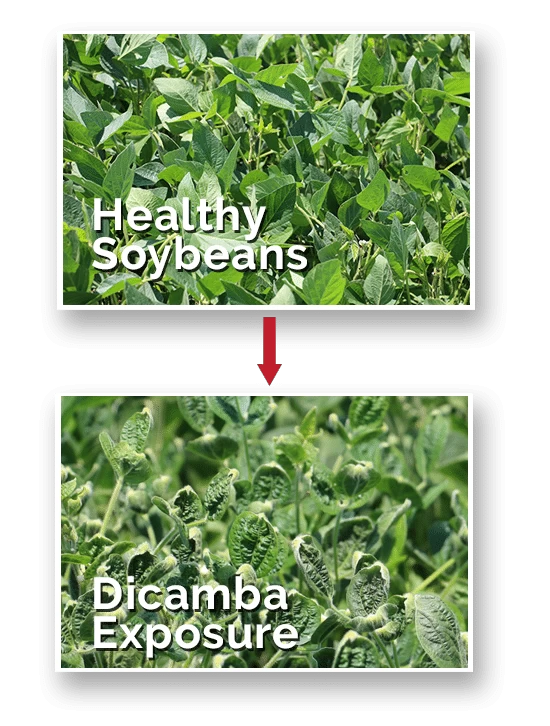Will Bayer Get the Drift on Dicamba?
The agrochemical company [ Bayer ] has been ordered to pay hundreds of millions of dollars in lawsui...
Over the past few years, dicamba herbicides like Monsanto’s XtendiMax, DuPont’s FeXapen, and BASF’s Engenia have been linked to millions of acres of crop damage. In the first lawsuit over dicamba crop damage to go to jury trial, a jury in February 2020 hit Bayer and BASF with a $265 million damage award to a Missouri peach farmer.
The attorneys of Peiffer Wolf represent farmers and landowners across the country. Through Peiffer Wolf’s work, Bayer has now agreed to pay up to $400 million to settle the dicamba crop damage cases. Anyone with suspected dicamba crop damage since 2015 should contact us by filling out a Contact Form or by calling 314-669-3600 for a FREE Consultation.
Dicamba is an herbicide that has been used for decades, typically as a pasture herbicide or for vegetation burn down prior to planting.
Monsanto developed XtendFlex cotton and Xtend soybeans, which are genetically-modified crops resistant to dicamba. This resistance allows for “over-the-top” application (application after the plants emerge from seed). Because XtendFlex and Xtend are resistant to dicamba, they will survive such applications while other weeds and plants will not.
Dicamba was approved for over-the-top application for XtendFlex and Xtend in Nov. 2016, which has caused a marked increase in dicamba utilization. This has led to estimated damage to millions of acres of non-target plants and crops.
Bayer has agreed to pay up to $400 million to settle dicamba crop damage cases. Anyone with suspected dicamba crop damage since 2015 should contact us for a FREE case evaluation by calling 314-669-3600 or emailing [email protected].
Bayer has agreed to pay up to $400 million to settle dicamba crop damage cases. Anyone with suspected dicamba crop damage since 2015 should contact us by filling out a Contact Form or by calling 314-669-3600 for a FREE Consultation.
Peiffer Wolf Carr Kane Conway & Wise (“Peiffer Wolf”) is a national law firm with offices in California, Louisiana, New York, Missouri, and Ohio. Peiffer Wolf is comprised of a sophisticated team of lawyers from around the country committed to one goal: Representing Farmers & Landowners with crop or plant damage from the application of dicamba. Although we are a national team of attorneys from around the country, our main office concerning Dicamba Damage Lawsuits is located in St. Louis, MO. Peiffer Wolf has the size, experience, resources, leverage, and manpower to prosecute complex cases against major corporations nationwide.
We attribute our Firm’s success to the high caliber, sophistication, and professionalism of our lawyers. Our lawyers are accomplished attorneys and are widely respected for their legal work.
The Dicamba Damage attorneys of Peiffer Wolf are filing claims of dicamba damage. Collectively, our attorneys are fighting for compensation for all Farmers & Landowners with crop or plant damage due to the application of Dicamba.
The agrochemical company [ Bayer ] has been ordered to pay hundreds of millions of dollars in lawsui...
Dicamba | Successful Farming | Chuck Abbott | August 8, 2020 “The herbicide dicamba is too ri...
Dicamba | The Farmer | Paula Mohr | July 22, 2020 “As of July 14, the Minnesota Department of...
Dicamba | High Plains Journal | David Murray | July 20, 2020 “The judicial fight over this ye...
Peiffer Wolf filed a class action lawsuit in the United States District Court for the Eastern District of Missouri on July 19, 2017 to assist farmers and property owners whose crops and plants have been damaged by dicamba. Bayer has agreed to pay up to $400 million to settle dicamba crop damage cases.
Dicamba is a potent herbicide to which soybeans and other crops and plants are especially susceptible. Complaints of dicamba damage have been increasing, and hundreds of thousands of acres in 2017 are showing damage. The State Plant Board in Arkansas recently passed emergency rules temporarily banning the use of dicamba for over-the-top soybean weed control.
The recent increase in dicamba damage coincides with the release of Monsanto’s Xtend soybeans and cotton. Xtend crops are genetically modified to be resistant to dicamba. The sale of these products has resulted in increased spraying of dicamba, and damage to non-target crops and plants.
This lawsuit seeks to recover compensation for the farmers and landowners with crop or plant damage from dicamba application and/or dicamba drift. A copy of the filed complaint is available here.
Anyone with suspected dicamba crop damage since 2015 should contact us for a FREE case evaluation by calling 314-669-3600 or emailing [email protected].
Learn More
